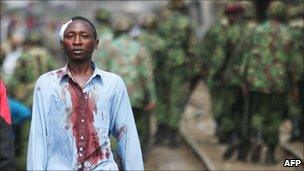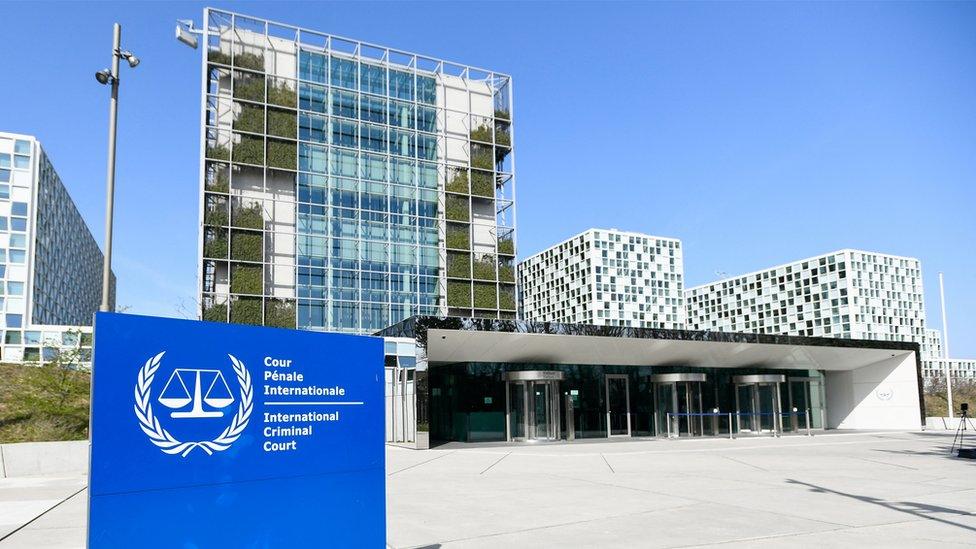Will ICC bring justice or violence to Kenya?
- Published

The violence left some 1,200 people dead and forced 500,000 to flee their homes
The International Criminal Court's chief prosecutor, Luis Moreno Ocampo, has named six people suspected of bearing the greatest responsibility for Kenya's post-election violence in 2007. The BBC's Josphat Makori reports from Nairobi on what this means for Kenya.
The ICC's move is being viewed by optimists as the end of the country's culture of impunity, but pessimists fear it could spark a new round of ethnic blood-letting.
Proponents of the Hague process see it as the only way of achieving justice in a country where those in high office have never been brought to account for their actions.
"As Kenyans we are very excited that the culture of impunity, especially at the highest levels, is finally being brought a close," Florence Jaoko, chair of the Kenya National Commission on Human Rights, told the BBC.
But there are fears that the naming of the suspects may trigger violence, especially because of the political influence wielded by some of them.
Key among the suspects is William Ruto, arguably the most influential politician in the populous Rift Valley, the area worst affected by the post-election violence.
'Clear conscience'
Mr Ruto is accused of having been a key planner of the violence but he and his allies have recently been holding public meetings in the region, dismissing the ICC process as a sham, even discrediting any evidence the court may be relying on.
There are fears the former minister for higher education could mobilise the community to cause violence, should any action be taken against him.
He has hinted that the charges are politically motivated but said he would be ready to face justice.
The ICC move is expected to have far-reaching ramifications in the politics of Kenya, as it touches deep into the inner circles of both President Mwai Kibaki and Prime Minister Raila Odinga - the two rivals whose dispute over the election triggered the violence and whose agreement to share power ended it.
The six names are split evenly between the two sides, so it is seen as balanced - even too much so.
One of the close allies of Mr Kibaki mentioned is Deputy Prime Minister Uhuru Kenyatta.
The 49-year-old politician, who is also minister for finance, is viewed as one of the front-runners to succeed the president and wields considerable influence in central Kenya.
Mr Kenyatta is accused of having coordinated revenge attacks carried out by the outlawed Mungiki gang, after members of his Kikuyu community were attacked in the Rift Valley.
He insists he is innocent and ready to go to The Hague.
"My conscience is clear, has been and will always be clear, that I have committed no crime," he told journalists in Nairobi after the Hague announcement.
A number of politicians from his region have dismissed the Hague process and have urged the government to pull out of the ICC.
Political observers in Kenya have seen the naming of Mr Kenyatta and Mr Ruto as giving Mr Odinga a huge advantage in the 2012 presidential elections, as they were seen as his main rivals.
Should the ICC judges rule that the two have cases to answer, their participation in the presidential race would be severely curtailed.
But perhaps the deepest Mr Ocampo has gone into Mr Kibaki's inner circle is in the naming of Head of Civil Service and Secretary to the Cabinet, Francis Muthaura.
Mr Muthaura is a long-term ally and key lieutenant of the president. He is accused by the ICC chief prosecutor of having presided over a security meeting at state house that issued shoot-to-kill orders to the police.
Soon after he was mentioned, Mr Muthaura dismissed the allegations and accused the ICC prosecutor of treating him unfairly.
"The prosecutor has not contacted me at any time or sought an account from me, he has not even tried. Yet he has thought it appropriate to name me," he said.
Uncomfortable questions
In naming the former police commissioner Major Gen Hussein Ali, Mr Ocampo may also have touched a sensitive nerve in government.
Mr Ali was named for his role as head of the police force that is accused of having carried out the post-election violence.
As commander-in-chief of the armed forces, the president may find this coming uncomfortably close to questioning his own responsibility.
These accusations against key allies appear to have prompted the president himself to release a statement in reaction to Mr Ocampo's announcement.
He said that in signing international treaties, the overriding desire of the country is to advance its own interests both locally and internationally.
In the ongoing debate about the ICC process, some have called on the president to remove from office anyone adversely mentioned, but he has indicated that he will not be doing so.
He said calls for action against them were "prejudicial, preemptive and against the rules of natural justice".
Mr Ocampo's list also touches one of Mr Odinga's key allies, Henry Kosgey, who is the chairman of Mr Odinga's Orange Democratic Movement (ODM) party. He is accused of planning the post-election violence.
Mr Kosgey, who is now the industrialisation minister, has remained close to the prime minister, even when most politicians from his Rift Valley region have broken ranks with him.
The prime minister, who initially had expressed his support for the ICC process, is yet to react to Mr Ocampo's announcement.
The heat generated by the ICC announcement was immediately felt in the country's parliament, where members interrupted its business to debate a motion urging the government to pull out of the ICC process.
On the streets of Nairobi, opinion is divided over Mr Ocampo's move.
While some have welcomed it, others fear that he might not get the necessary co-operation from the government.
"The president's close allies have been named, I don't think he'll allow anything to be done against them," said Rashid Abdi, a street vendor.
The government has said it is beefing up security countrywide to forestall any violent reactions that may follow the announcement.
- Published15 December 2010
- Published7 January 2015
- Published15 December 2010
- Published7 February

- Published27 August 2010